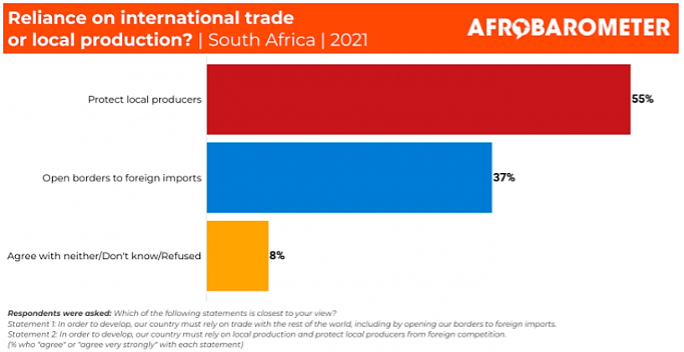Most South Africans prefer a closed economy, according to new Afrobarometer dispatch

A small majority of South Africans would prefer limitations on cross-border movement in the region, according to a new dispatch from Afrobarometer.
Overall, many South Africans express a preference for a self-reliant economy, limiting the influence of international donors or financial institutions, and minimising the role of cross-border trade. The survey also probed South Africans’ perceptions of the country’s development model, its major trading partners, and the role of China in South Africa’s economy.
The levels of support for limiting cross-border movement are higher among older and more educated respondents, with 54% of urban respondents favouring cross-border limitations compared to only 44% of rural residents.
In a similar vein, nearly half of all respondents (47%) believe only citizens should be allowed to trade in goods, while a slightly smaller share (43%) believe foreign nationals should also be allowed to trade. There is greater agreement among South Africans, at 55% of the sample, for protecting local producers from foreign competition.
In terms of how economic development should be funded, three in five South Africans (62%) agree that national resources should drive development, as opposed to relying on development funding or loans. A small majority of South Africans (51%) believe that when the state does receive funding for development, it should be able to use the funding according to its own needs, without being restricted by conditions from lenders.
The survey also gauged South Africans’ perceptions of the country’s major development partners. When asked to identify the best model of development for South Africa to emulate, the United States was the clear forerunner, identified by 37% of respondents, followed by China (20%). A further 11% of respondents expressed that South Africa should follow its own development model, without trying to emulate other countries’ experiences.
The external influence of the United States and China is perceived to be more positive than negative among South Africans. Russia’s influence was ranked as among the most polarising out of all countries and groups mentioned, with 30% of respondents reporting a positive influence and 20% indicating a negative influence. Importantly, these results were recorded well ahead of Russia’s invasion of Ukraine in 2022.
Finally, South Africans were asked to give their views on China’s role in South Africa’s economy. Over the last decade, the Chinese influence in Africa has expanded rapidly, with some critics questioning the intentions of this economic expansion.
Although nearly 30% of respondents claim to not know about China’s economic activities in South Africa, 42% of respondents believe that China has a lot of influence in the economy. Of those who claim to know about China’s influence in South Africa’s economy, roughly two in three (68%) believe that the government has borrowed too much money from China.
The latest dispatch from Afrobarometer’s study of South Africa reveal the perceptions underlying much of the public debate regarding xenophobic sentiments and South Africa’s role in the region. Many South Africans are opposed to freedom of movement, although this not an overwhelming majority.
The eighth round of Afrobarometer surveys in South Africa, conducted in May and June 2021, asked South Africans a series of questions relating to their views on South Africa’s role in international affairs. The survey was conducted via face-to-face interviews in multiple languages and the sample size was 1600 adults, weighted to be nationally representative.
Mikhail Moosa, Project Leader: South African Reconciliation Barometer
